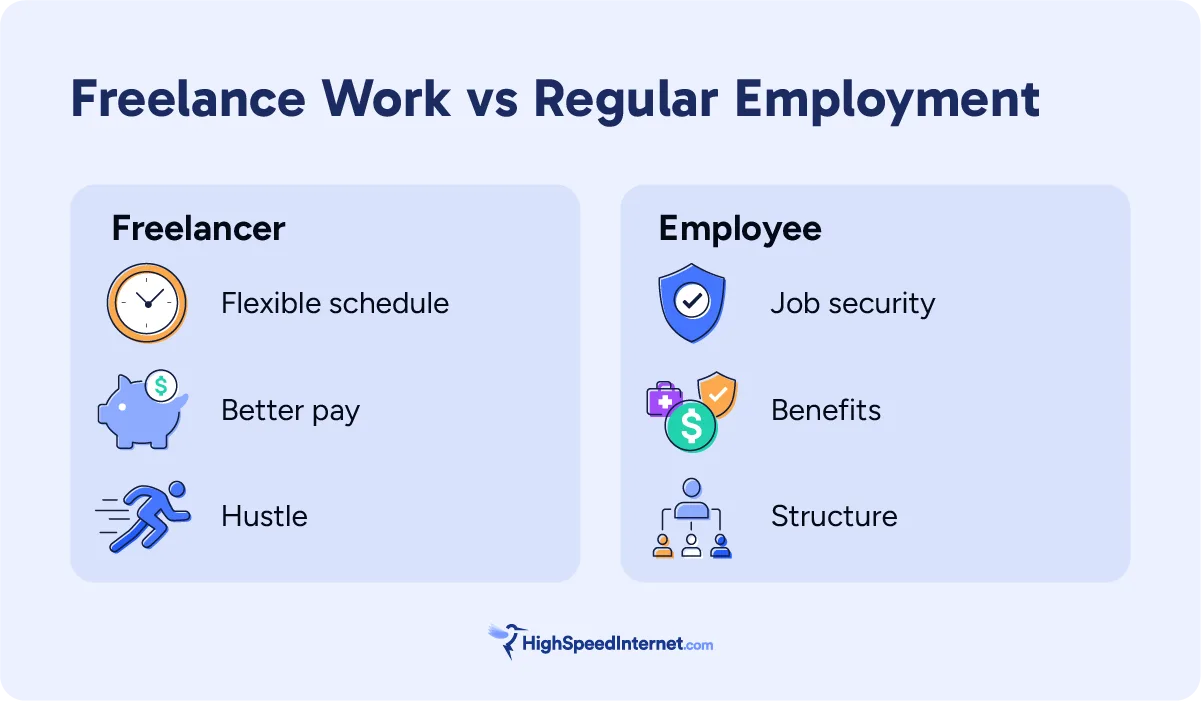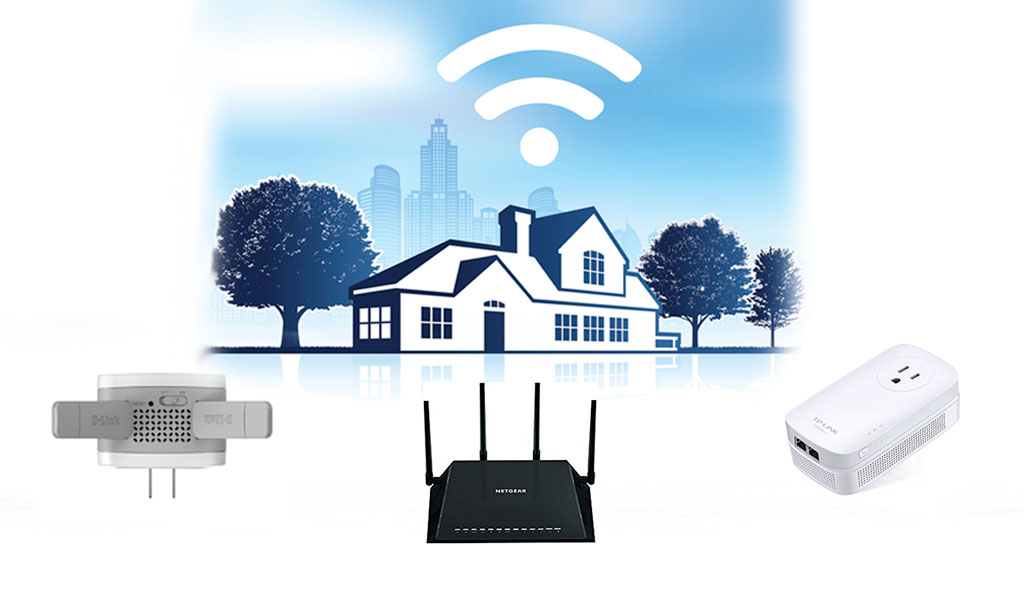Making Money by Freelancing
Now I can make it on my own
May 22, 2025 | Share
How-To
Is a traditional job too restrictive for your style? Do you want maximum flexibility in your work schedule? You might have better luck as a freelancer. Finding work as a freelancer is often easier than securing a full-time job, but earning a decent living can be much harder. Freelancers not only have to spend time doing their actual work but also finding new clients.
Those with the motivation and disposition to handle multiple clients and deliver quality work can even earn a better living by freelancing than working for a single company. If you’re curious about working as a freelancer, we’ll break down some of the pros and cons while showing you some of the best ways to find freelance work.
In this guide:
What is freelancing? | Freelancing vs. employment | Common freelance jobs | Where to find freelance jobs | Best internet for freelancing | Tips for freelancing | The bottom line
In this guide:
What is freelancing?
Freelancing is a form of self-employment that typically involves contract work for other companies or individuals without being formally employed by them. This differs from entrepreneurs or whose goal is to create their own business. As such, freelancing includes everything from business consultants making six-figure incomes to delivery workers trying to survive off tips.
Although freelance work doesn’t require specific experience, you still need to have skills for most jobs—especially those that pay well. There are lots of freelance gigs for those with skills in writing, video editing, graphic design, and web development. You can also find freelance jobs that don’t require any experience, but these are usually severely underpaid (when not outright scams).
Freelance work vs. regular employment
Large companies often utilize both regular employees and freelancers, who might even be working on the same projects. So what’s the difference? Quite a lot.

Flexibility vs. security: Freelance jobs give you a lot of flexibility in your work schedule. While you might still have tight project deadlines, you get to decide how to reach those goals. However, since you’re only hired for a single project, you have to be constantly on the lookout for the next opportunity. Finding a steady stream of reliable clients is a lot of work on its own and requires its own set of skills. While getting through the interview process for a traditional job can be a lot harder than getting a freelance gig, once you’re hired, you don’t have to worry about finding work to do.
Better pay vs. benefits: You can often get paid more as a freelancer than you would doing the same job as a regular employee. It’s important to remember, however, that paychecks for freelance work are larger because you don’t have deductions for taxes and benefits. Freelancers need to know how to coordinate their own insurance and set aside money for state and federal taxes.
Hustle vs. structure: As a freelancer, there is no upper limit on what you can do in a work week, which is both a blessing and a curse. If you can juggle multiple projects simultaneously without overworking yourself, you can make a really good living as a freelancer. Of course, you don’t have the support from an organizational structure like an IT department, accountants, or a legal team. Also, as your own boss, the burden of making sure you get regular breaks and reasonable work hours lies on yourself.
Common freelance jobs
If you’re an expert in your field with a long resume of work experience, chances are you can find freelancing or consulting gigs just about anywhere. Trying to make it as a freelancer can be pretty daunting for those who are just starting out or want to switch careers.
Fortunately, some fields regularly use freelance workers with little or no experience. The challenge, then, is making sure that these jobs are worth your time and effort.
Transcription and translation jobs
As long as you have good attention to detail and speak English, it’s possible to get a transcription job. Transcription usually involves taking an audio file and converting it into written text or correcting an automated draft transcript. These jobs usually only require strong English skills, a computer, and a dependable internet connection.
If you’re fluent in multiple languages, you could consider a job in translation. Translation is an art, and really good translators are hard to find. While fluency is the minimum requirement for entry level jobs, the best translators competing for big projects have years of experience. That means that even if you’re perfectly bilingual, you won’t be working on the Mandarin translation of the next Marvel movie, but there are piles of business documents that are waiting for someone like you to come along.
Writing and editing jobs
If simply transcribing words all day sounds too boring, you could try to find a job where you write them instead. Lots of people get degrees in writing-related fields, so there’s much more competition for these jobs. Still, plenty of companies need bloggers, grant writers, and proofreaders.
Writing original content takes more effort than simply transcribing someone else’s words. Due to the competition for these jobs, many shady employers will try to exploit new writers and undervalue their time and labor. Although many online content mills have turned to AI to churn out their content, there are plenty of jobs out there that aren’t worth your time. If a company offers to pay you five cents per word or let you write for the exposure, don’t waste your time.
Design and media jobs
Freelance work is very common for graphic designers, and there are usually a lot of opportunities out there, especially with small businesses and startups. This is especially true if you have more specialized skills, such as web design or video production.
While design jobs require proficiency in the necessary tools and techniques, most don’t require formal education. Rather than a degree, employers are usually more interested in candidates with a strong portfolio, which means that there is a much lower barrier to entry as long as you put in the time to develop your design skills. It’s also a good idea to set up a portfolio site once you have a body of work you’re proud to show off.
Driving and delivery jobs
The modern gig economy was propelled by a slough of tech startups like Uber, Lyft, and Instacart. These driving and delivery jobs are pretty easy to get as long as you have a car and a smartphone. This has made them popular among students, who often have unusual work schedules, and those looking for a side hustle to supplement their day jobs.
While just about anyone can work as a rideshare driver or delivery person, making a good living with these gigs can be hard. As with other freelance jobs, a lot of the expenses that would normally be covered by your employer, like gas and vehicle maintenance, fall on you. You’re also not paid for the time you spend waiting around between rides, so it’s important to take all these calculations into consideration when deciding if a job is worth your time.
Where to find freelance jobs
It can be difficult to find freelance jobs that pay well. If you’re looking for more consistent freelance work with a better pay rate, you’re probably better off just using the usual job sites like LinkedIn and Indeed. Freelancers also benefit from making connections with businesses in their local communities. If you know a local business with a need you could fill like a website or a logo redesign, it’s good to be proactive and reach out first. Making industry connections is ultimately the best way to turn freelancing into a sustainable career, so any opportunity to connect with a client more directly is probably worth it.
There are several sites geared more specifically toward freelance workers like Upwork, Freelancer, or Fiverr where potential employers can post potential jobs, and freelancers can bid for the work. While these sites can connect you with potential employers from around the world, you’ll be competing against lots of people with wildly different levels of experience and pay expectations. Also, since you generally have to write some kind of proposal or provide a sample of your work, you might end up doing a lot of unpaid labor vying for jobs that don’t pay very much.
Best internet for freelancing
Since freelancing differs so much from person to person, internet requirements can vary just as much. It’s important to figure out how much speed you need to do your job effectively while avoiding overpaying, as your finances might be pretty tight, especially when you’re just starting.
Freelance workers often have a much greater need for mobile internet plans or hotspots. This is most pronounced for drivers who need to stay connected to an app to pick up and deliver passengers or deliveries, but it can also be helpful for other freelancers who might have to meet up with clients in non-traditional locations like coffee shops or coworking spaces.
Does your internet connection give you everything you need to work from home?
Do you need a faster connection? More flexible? Enter your zip code to see what plans are available at your location.
Tips for freelancing
Freelancing can be very rewarding, but it also comes with many challenges that other career paths don’t encounter. It’s easy to end up working for less than you’d make at even a low-wage job if you don’t look at the big picture. If you want to work as a freelancer long-term, here are some tips to make it a sustainable job.
Have realistic expectations
Just because a job doesn’t require experience or a degree doesn’t mean anyone can do it. There are plenty of freelance jobs that you can get with no experience, but to land a competitive, high-paying job, you probably need to build your skills and portfolio for years.
For example, I often see people recommending voice acting for audiobooks or text-to-speech systems as good work-from-home options. You certainly don’t need to have a degree from Julliard to be a great voice actor, but if you’ve ever had to listen to your weird uncle’s Sean Connery impression, you know acting doesn’t just come naturally to everyone.
It’s easy to get your foot in the door with freelancing, but it takes a lot of work to turn it into a sustainable full time job. Yes, some freelance tech consultants can pull in seven figures and only work three days a week. But countless people also work themselves to the bone and don’t even make minimum wage.
Avoid Scams
While freelancing can be great, this is also where we start to see more scams and false promises. Be wary of influencers who try to sell you on some easy, high-paying dream job because if it were true, there would be a lot of competition.
There are a few major red flags to look out for. If a freelancing opportunity ever requires a cost for you up front, such as signing up for a course or a workshop, it’s a scam.
Similarly, jobs that require you to do unpaid work are best avoided. Some potential clients, as well as job boards like Fiverr, might ask for samples of your work before hiring you. In a normal situation, your portfolio should fill this role. Scammers sometimes solicit sample projects and then simply use the samples while hiring no one. Even if the request is well-intentioned, you can end up wasting more time and labor applying to jobs than actually working for pay. If a client asks you to create new sample work, you should either push back on this request or simply move on.
You should also beware jobs or clients that have unclear or unfair expectations. Freelancing requires clear expectations for both the work you deliver and the pay you receive. Minor revisions are normal on many types of freelance projects, but you don’t want to sign up for a job where the goalposts keep moving.
In a case where a client might want to change directions in the middle of a project, it’s a good idea to negotiate being paid some portion of your fee upfront and have the client approve certain milestones throughout the project. If the client wants to go back and change something after they’ve approved it, you’ll need to renegotiate the project’s cost.
Similarly, you should be wary of any client who gives you low-ball offers, tries to defer your payments until later in the project, or includes one-sided legal terms in your contract. While someone with less experience can’t demand the same rates as an expert in the field, you don’t want to be taken advantage of by someone offering you far less than the going rate for that work. Which brings us to my next tip.
Do your research before you dive in
If you’re considering freelancing, it’s a good idea to find someone who does the exact job you’re looking at (or as close as you can get) and see if the schedule and the pay would work for your situation. They might be very comfortable making a few hundred bucks a month doing commissions on DeviantArt, but if you’ve got kids and a mortgage, you might need something that pays a bit better.
If you think this kind of work would actually be a good fit for you, make sure you learn the ins and outs of the industry. What’s a reasonable rate for someone with your experience? What do contracts typically look like? How should you interact with your clients? Every field also has its own red flags to look out for. For example, video editors should be wary of clients who misuse technical terminology or conflate multiple filmmaking roles, as they might expect you to do more than you’re actually signing up for.
The one thing that all freelance work has in common is that you’re on your own. That means handling your own medical insurance, using your own computer, setting up your own home network, and filing your own taxes. And, of course, it means having a good internet connection.
The bottom line: Freelancing takes high effort for high reward
You have almost unlimited earning potential as a freelancer, but you have to handle a lot of extra work. In addition to the work itself, you’re in charge of finding your own clients, handling your own insurance and taxes, and maintaining your work-life balance. It’s important to know what your time is worth, even when competing against newbies who are willing to work for peanuts.
If you’re the self-motivated type who can stick to a deadline and has a passion for learning and growing, freelancing might be the path for you.
Author - Peter Christiansen
Peter Christiansen writes about telecom policy, communications infrastructure, satellite internet, and rural connectivity for HighSpeedInternet.com. Peter holds a PhD in communication from the University of Utah and has been working in tech for over 15 years as a computer programmer, game developer, filmmaker, and writer. His writing has been praised by outlets like Wired, Digital Humanities Now, and the New Statesman.
Editor - Jessica Brooksby
Jessica loves bringing her passion for the written word and her love of tech into one space at HighSpeedInternet.com. She works with the team’s writers to revise strong, user-focused content so every reader can find the tech that works for them. Jessica has a bachelor’s degree in English from Utah Valley University and seven years of creative and editorial experience. Outside of work, she spends her time gaming, reading, painting, and buying an excessive amount of Legend of Zelda merchandise.




